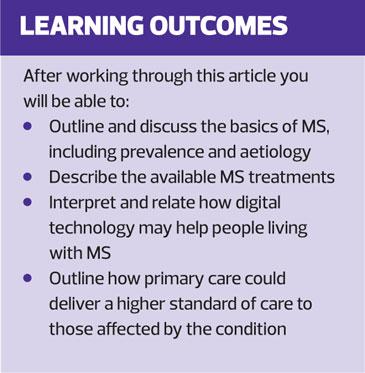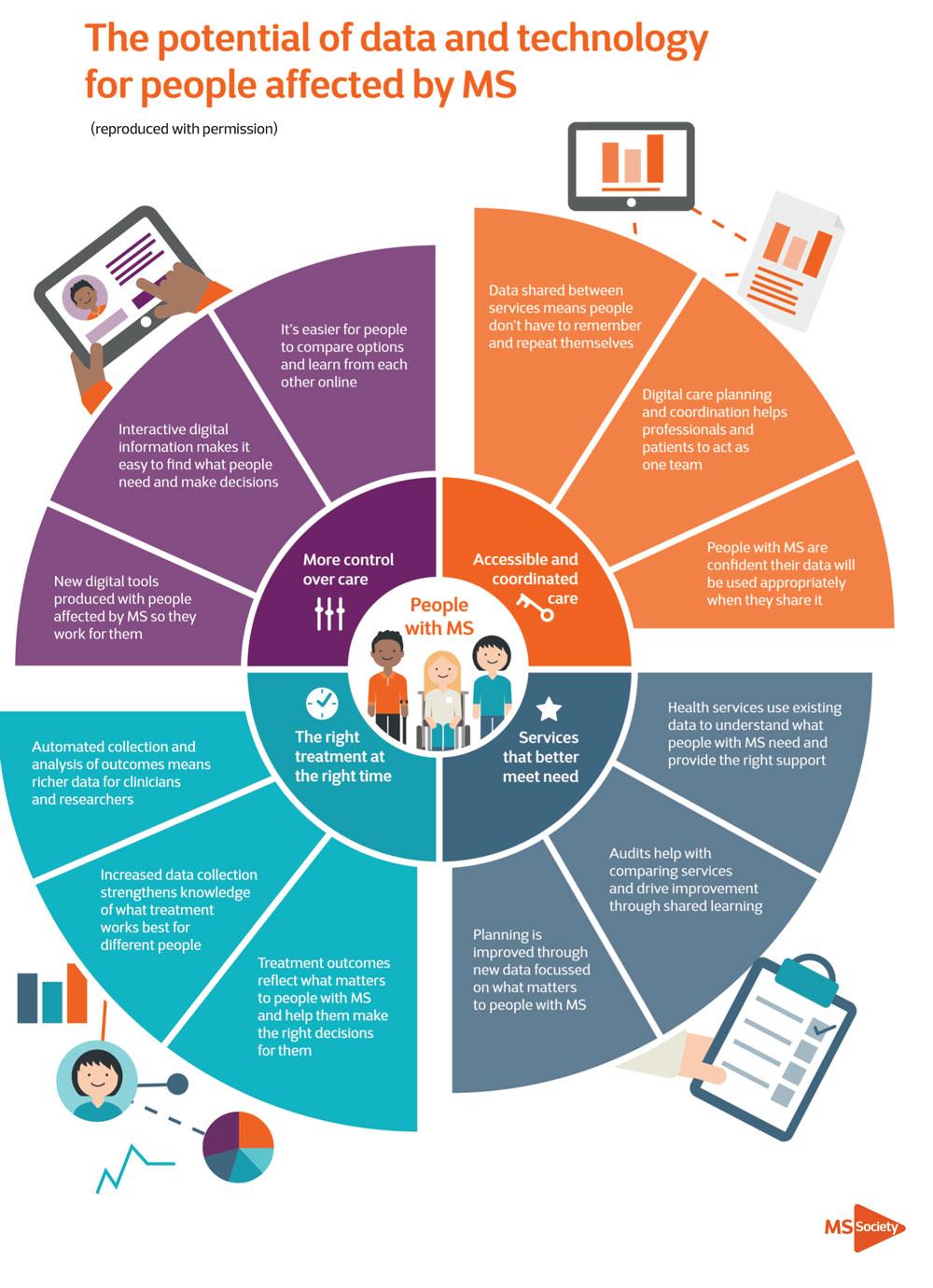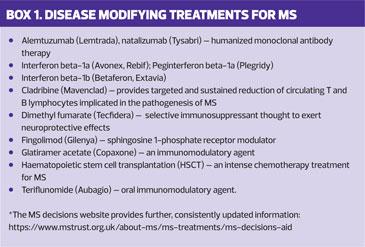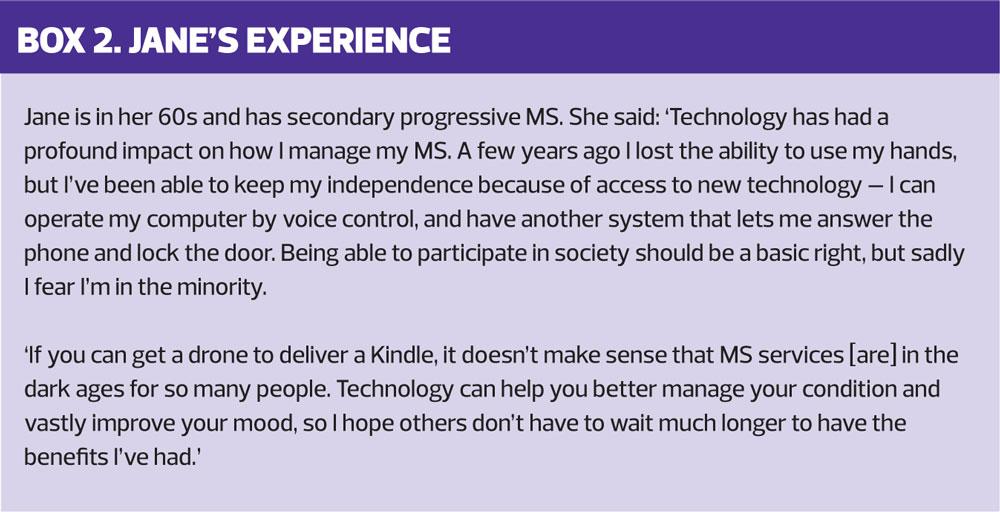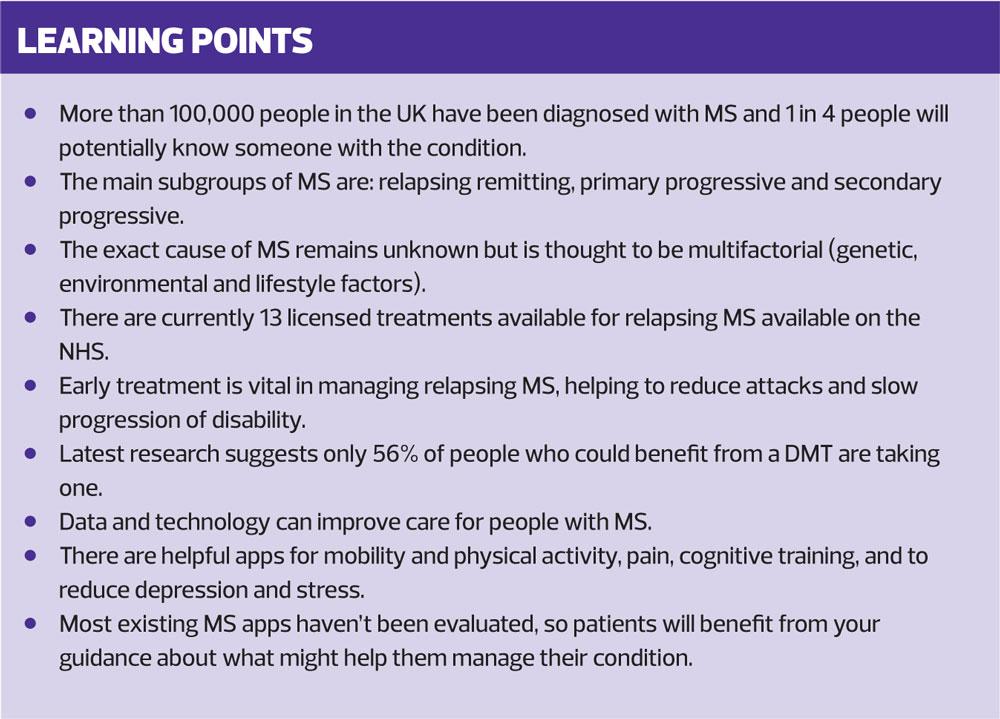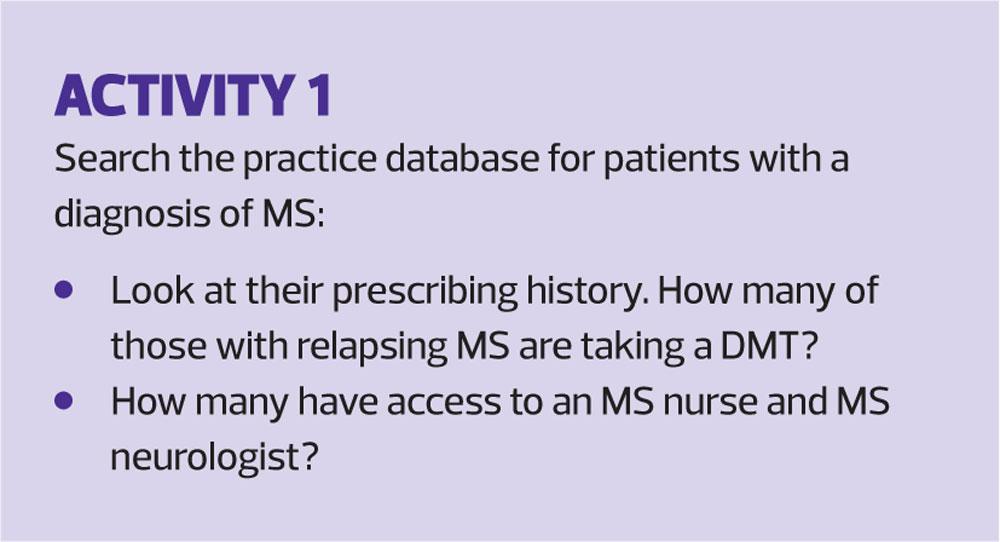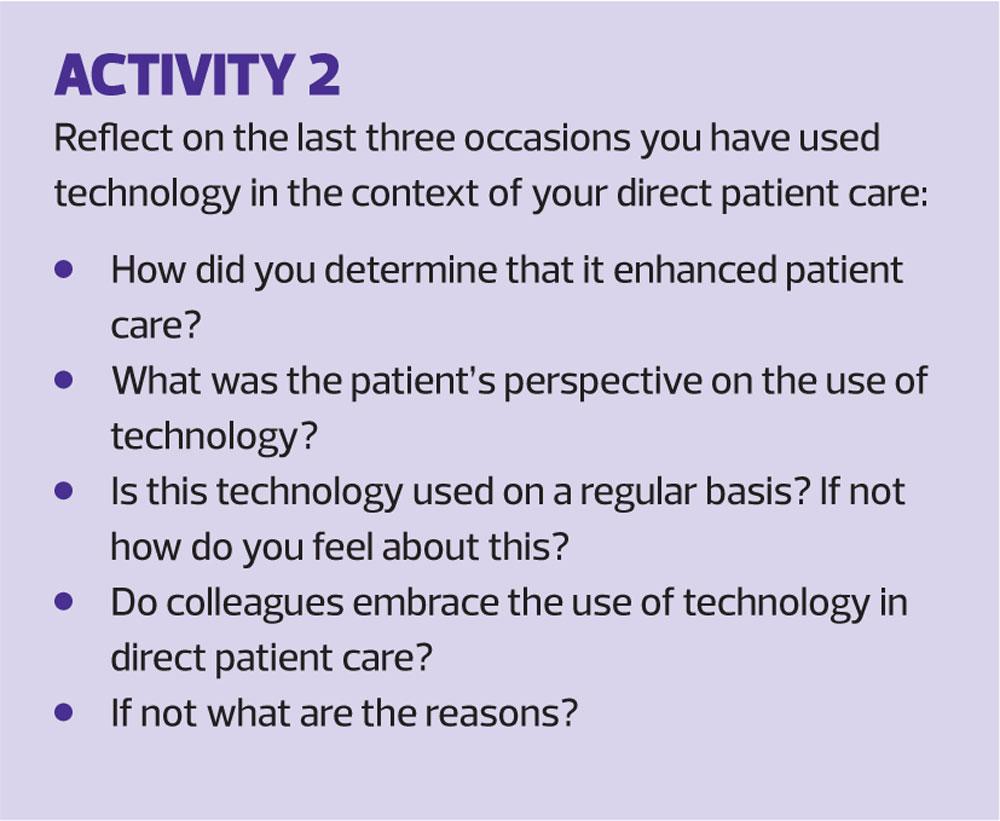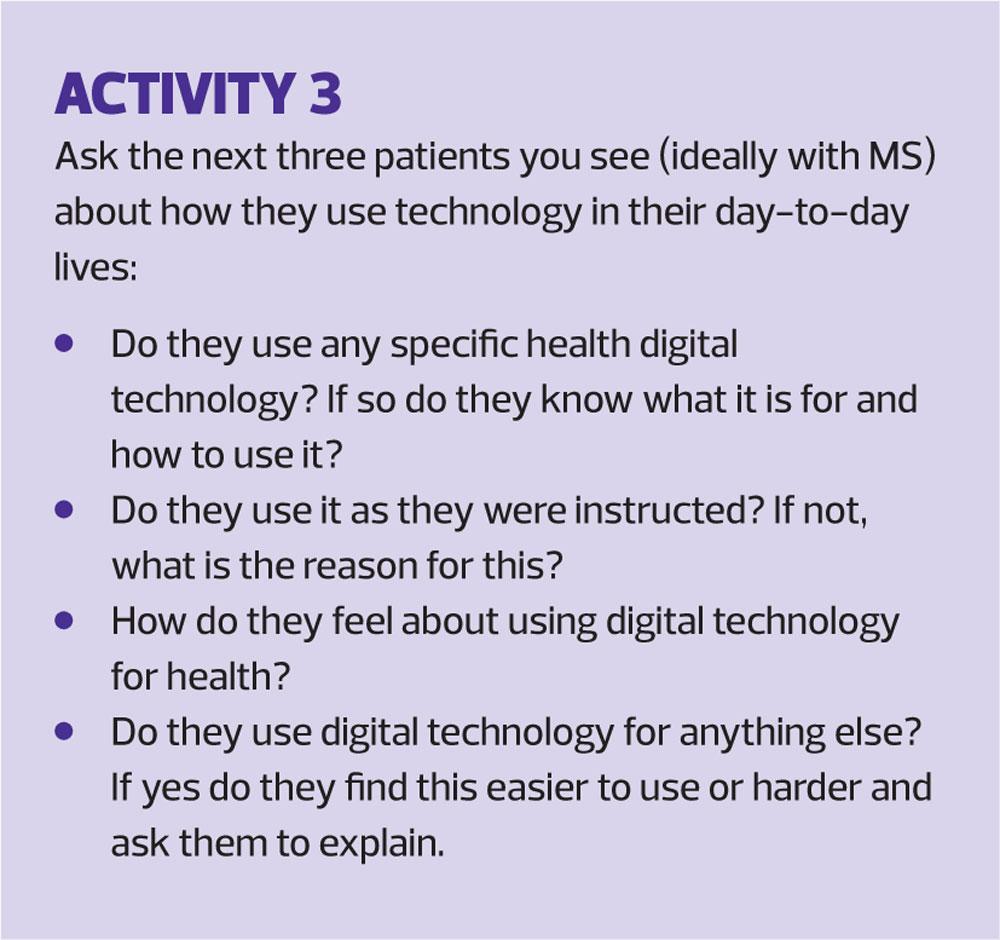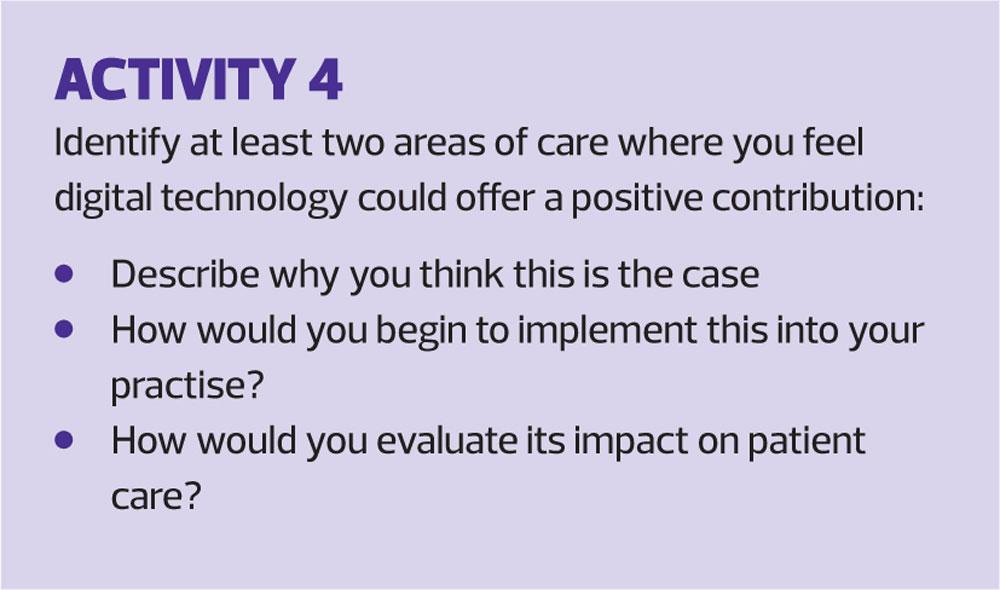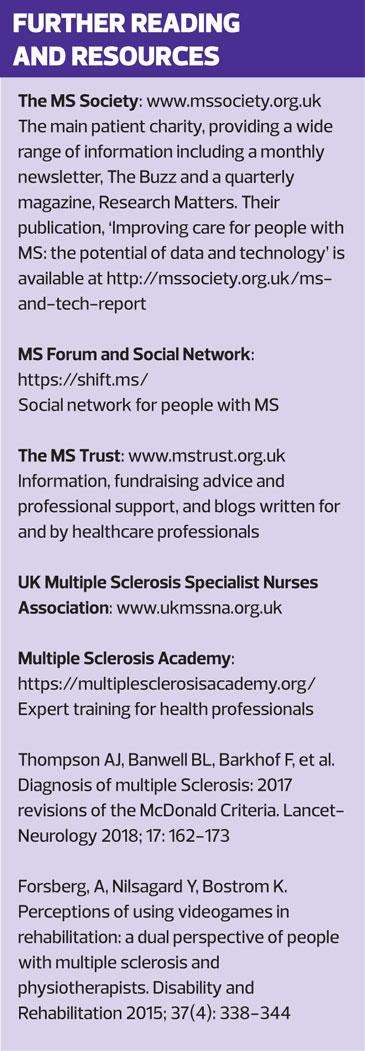Supporting people with multiple sclerosis
KAREN VERNON
KAREN VERNON
RGN, BSc (Hons), PGD, MSNIC
Multiple Sclerosis nurse consultant, Salford Royal NHS Foundation Trust
Multiple sclerosis (MS) is an unpredictable condition that affects more than 100,000 people in the UK. While it is unlikely that the average general practice nurse would treat MS, there is a role for the practice nurse in supporting those affected, and an emerging role for digital technology
Multiple sclerosis (MS) is not something the average practice nurse would treat, many of you will still work with patients with MS on a regular basis. Having a solid understanding of MS will allow you to provide a much higher standard of care and support for anyone affected – whether that be the person themselves, their immediate family, or their carer.
MS: THE BASICS EXPLAINED
MS is an incurable condition of the immune system, affecting the brain and spinal cord. In MS the myelin sheath, the coating that protects a person’s nerves, is damaged. This can cause a range of symptoms affecting everything from how a person walks, moves, sees, thinks, or feels.1 The course is unpredictable and different for everyone, a crucial fact to remember when speaking with affected patients.
More than 100,000 people in the UK have MS, and 1 in 4 of the population are likely to know someone with the condition. People are most likely to be diagnosed in their 40s and 50s, but many notice initial symptoms years before they receive a diagnosis. In fact, MS can in fact strike at any age and, although it is much less common, cases of MS can and do occur in childhood.
Women of reproductive age are almost three times more likely to be diagnosed with MS than men, yet before and after the menopause the rates are the same. We don’t fully understand exactly why these differences exist, but scientists think hormones could be one of the reasons. This is one of several important aspects of MS where further research is needed.
TYPES OF MS
There are different forms of MS:
- Relapsing remitting
- Primary progressive
- Secondary progressive.2
In relapsing remitting MS a person experiences distinct episodes of increased symptoms, which resolve either partially or completely. About 85% of people with MS are diagnosed with this type of the condition.2
In the progressive forms of MS, symptoms gradually get worse over time. There are two ‘types’ of progressive MS, primary and secondary. In primary progressive MS, symptoms are progressive from the point of diagnosis. The rate of change, however, can vary between patients. Secondary progressive MS develops, for some, after a person has been living with the relapsing form of the condition. They tend to not experience relapses, and disability will steadily increase.2
CAUSES
Although researchers develop deeper insights every day into why people develop the condition, the exact cause of MS remains unknown. Inevitably, this lack of certainty can be a source of great frustration for some people, particularly those who are considered to be at greater risk of developing MS. What we do now know, however, thanks to latest research, is that MS is caused by a combination of things, including a mix of genetic, environmental and lifestyle factors.3
Genetic factors
There is no single gene that causes MS. Over 100 genes might affect the chances of having the condition and it is not directly passed on from parent to child. In fact, there is only about a 1.5% chance of a child developing MS when a parent has it, and around a 2.7% chance if a sibling has it. A 2014 study indicated a genetic connection may be even less likely than these figures suggest.4
Environmental factors
Two of the most commonly cited environmental factors are infections and vitamin D levels.
The connection between MS and vitamin D is one that needs further research, but we do know that MS is less common in tropical countries near the equator, which get lots of sun. In places further away from the equator, like the UK, MS prevalence is much higher, regardless of ethnic background. More and more evidence is emerging to suggest that low levels of vitamin D, especially prior to puberty, could play a role in the development of MS.
There's also evidence to show that some viruses, and maybe bacteria, can trigger the condition, but again they are not the whole story. Epstein Barr, the virus that causes glandular fever, has been notably linked to MS. It’s important to remember that though most people have had this virus at some stage, the majority will never get MS.
Lifestyle factors
Studies show people are more likely to get MS if they smoke.5 Again, we don’t yet fully understand why this is but there is research to suggest it might be related to the chemicals in cigarette smoke affecting the immune system. Patients with relapsing MS who smoke should be made aware that by quitting the habit, they can slow down how fast their condition develops to secondary progressive MS.
Researchers have also established a connection between MS and obesity.6 This is particularly apparent among children and young adults. A potential rationale for this connection is that obese people are often low in vitamin D. Obesity can also make the immune system become overactive and cause inflammation. Obviously not all people who are very overweight get MS, but if your patient thinks they may be at risk, then weight is a risk factor they can do something about.
TREATING MS
There are lots of different ways to manage MS – the best way is as individual as the people with MS themselves. Some treatments help with the symptoms of MS, while others control MS itself.
While MS has no cure, there are effective treatments available for the relapsing forms of the condition, relapsing remitting MS and secondary progressive MS with relapses. These are known as disease modifying therapies DMTs).1 DMTs can reduce the number and severity of relapses, and can also slow down the build-up of the damage caused by relapsing MS over time.(Box 1)
There is ample evidence that early treatment is absolutely vital in managing relapsing MS, helping to reduce attacks and even slow progression of disability.5 Unfortunately, research suggests only 56% of people who could benefit from a DMT are taking one, although access has improved significantly in recent years.6 There could be a number of factors contributing to this, but additional research from the MS Society shows that when people with MS feel well informed about treatment options, and have access to an MS nurse and specialist MS neurologist (‘MS-ologist’), access to treatment improves significantly (from 12% to 80%).7
Symptom management is an essential element of MS care. Some of the most common symptoms include eye problems, pins and needles, fatigue, pain, and bladder and bowel problems. There are lots of treatments, therapies, lifestyle changes and devices that help with the symptoms, complications or disability caused by MS.
As with every condition, it’s important to remember that treatment isn’t the right option for everybody. Also, there are still no DMTs available on the NHS for patients who do not have a relapsing form of MS, but breakthroughs are on the horizon and organisations like the MS Society are driving research into more and better treatments.
It is also important to bear in mind that drug therapy is not the only thing to consider for people with disabling illnesses, like MS. Information to help people to understand their condition and how to manage it, as well as aids that help with daily activities and maintaining independence are equally important. Advances in technology can have an increasing role. Digital technology can help people with MS better manage the logistics of their condition, particularly in relation to their drug therapies and general self-management advice.
DIGITAL TECHNOLOGY AND THE MS PATIENT
At Salford Royal NHS Foundation Trust we have been on a real digital journey. As a Global Digital Exemplar, we can now not only identify the thousands of people with MS under our care, the treatments they’re taking and how they use the service, but also the people who haven’t been seen, and how we are performing overall.
Recently we have worked with the MS Society and Nuffield Trust on a new report that looks at how data and technology can improve care for people with multiple sclerosis (MS). Improving care for people with MS: the potential of data and technology,9 (Figure 1) unveils a series of proposals from healthcare, industry, and technology specialists, which could transform MS services and commissioning – and ultimately improve health outcomes for people living with MS in the UK.
Nurses who might be interacting with people with MS on a regular basis are in an important position to build these insights into everyday practice, by sharing with patients the various ways that data and digital technologies might be used to improve their overall quality of life. There is generally very little space for these important conversations to take place in consultations and conversations around treatment, but we must find time for them wherever possible.
TALKING POINTS
Digital technologies can help people with MS maintain some independence. Look at Jane’s experience. (Box 2) In order to support patients in this area there are some things you will need to consider.
The Internet is an overwhelming place
As we all know, most patients will use the Internet to find information about their disease, but this can leave people feeling overwhelmed by the range of advice available. Furthermore, most existing apps for MS haven’t been evaluated, so neither patients nor professionals know what’s available or the validity of information the apps provide. Where possible, guiding your patient through their options will make an immense difference to their confidence and ability to manage overall.
Know the options
Nearly everyone has access to basic digital tools (smartphones, tablets, and computers) that will give them greater control of their condition. For nurses wanting to help their patients navigate the increasing options available, broadly knowing what’s out there can be a great help. There are amazing apps for mobility and physical activity, pain, cognitive training, and even apps to reduce depression and stress.
As Jane says, many people with MS won’t know where to look for new technologies that might improve their quality of life. Things like voice activated technology can be an incredible support to help those with more advanced MS maintain some independence.
As well as offering immense help practically, the impact on a patient’s mood can be profound. The ability to contact friends, to do online shopping, or being able to access the news and social media channels can all be useful tools in helping to combat social isolation.
SUMMARY
The unpredictable nature of MS can make it difficult for those affected to come to terms with and manage their condition. Digital tools can help but they are not a magic bullet. They can never be a replacement for caring, knowledgeable professionals.
A consistent finding in the MS Society’s work was that digital tools work best when they are part of a broader intervention involving nurses, physiotherapists, or others. In other words, digital tools are generally at their best when they are augmenting the things we do already.
Where useful technologies do exist, nurses can help by promoting them to patients who might benefit, but also to other healthcare professionals involved in their care.
REFERENCES
1. NHS. Multiple Sclerosis. https://www.nhs.uk/conditions/multiple-sclerosis/
2. MS Society. Types of MS. https://www.mssociety.org.uk/about-ms/types-of-ms
3. NHS. Multiple Sclerosis Causes. https://www.nhs.uk/conditions/multiple-sclerosis/causes/
4. Westerlind H, Ramanujam R, Uvehag D, et al. Modest familial risks for multiple sclerosis: a registry-based study of the population of Sweden. Brain 2014;137(3):770-778
5. Degelman ML, Herman KM. Smoking and multiple sclerosis: A systematic review and meta-analysis using the Bradford Hill criteria for causation. Multiple Sclerosis and Related Disorders 2017;17:207-216. doi: 10.1016/j.msard.2017.07.020.
6. Mokry L E, Ross S, Timpson N J et al. Obesity and Multiple Sclerosis: A Mendelian Randomization Study. PLoS Medicine, 2016;13(6):e1002053.
7. Giovannoni G, Butzkueven H, Dhib-Jalbut S, et al. Brain Health: Time Matters in MS. Oxford PharmaGenesis Ltd. 2015 http://www.msbrainhealth.org/perch/resources/time-matters-in-ms-report-oct15.pdf
8. MS Society. What My MS, My Needs means to me. August 2016.
9. MS Society. Improving care for people with MS: the potential of data and technology. June 2018.
Related articles
View all Articles
